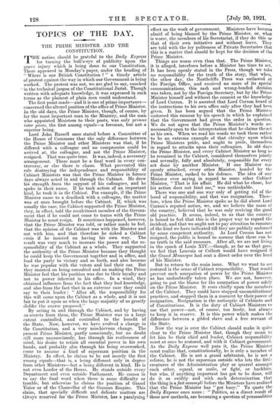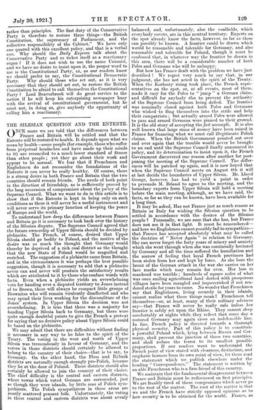TOPICS OF THE DAY.
THE PRIME MINISTER AND THE CONSTITUTION. THE nation should be grateful to the Daily Express for turning the bull's-eye of publicity upon the grave injury which is being done to our Constitution. There appeared in Monday's paper, under the heading of "Where is our British Constitution ? " a timely article of protest against the way in which our Government is being worked. The protest was not, we are glad to say, couched ' in the technical jargon of the Constitutional Jurist. Though written with adequate knowledge, it was expressed in such terms as the plainest of plain men could understand. The first point made—and it is one of prime importance— concerned the altered position of the office of Prime Minister. In the old days, the Prime Minister, though, of course, by far the most important man in the Ministry, and the man who appointed Ministers to their posts, was only primus inter pares, the first among equals—a foreman, but not a superior being. Lord John Russell once stated before a Committee of the House of Commons that the only difference between the Prime Minister and other Ministers was that, if he differed with a colleague and no compromise could be arrived at, the colleague, and not the Prime Minister, resigned. That was quite true. It was, indeed, a necessary arrangement. There must be a final word in every con- troversy, or else there is chaos. What prevented this rule destroying the independence and responsibility of Cabinet Ministers was that the Prime Minister in former days always acted in and through the Cabinet. He drew his strength from the support of his colleagues, and he spoke in their name. If he took action of an important kind, he took it in the Cabinet. For example, if the Prime Minister came to a deadlock with a colleague, the matter was at once brought before the Cabinet. If, which was usually the case, the Cabinet supported the Prime Minister, they, in effect, told the recalcitrant member of the Govern- ment that if he could not come to terms with the Prime Minister he must resign. It sometimes happened, however, that the Prime Minister was told, or rather made to feel, that the opinion of the Cabinet was with the Minister and not with him, and that therefore he risked a Cabinet crisis if he insisted on having his own way. The result was very much to increase the power and the re- sponsibility of the Cabinet as a whole. They supported the authority of the Prime Minister because they thought he could keep the Government together and in office, and lead the party to victory and so forth, and also because he was popular with the voters and had their ear. But they insisted on being consulted and on making the Prime Minister feel that his position was due to their loyalty and not to power inherent in his office. In a word, they obtained influence from the fact that they had knowledge, and also from the fact that in an extreme case they could say to their leader : "After all, the responsibility for this will come upon the Cabinet as a whole, and it is not fair to put it upon us when the large majority of us greatly dislike the course proposed."
By acting in and through the Cabinet, and by having ao secrets from them, the Prime Minister was to a large extent controlled, and controlled to the benefit of the State. Now, however, we have evolved a change in the Constitution, and a very mischievous change. The Present Prime Minister, partly consciously, but no doubt still more unconsciously, has through his restlessness of mind, his desire to retain all essential power in his own hands, and probably also through his being overworked, come to assume a kind of superman position in the Ministry. In effect, he claims to be not merely the first among equals—that is, a being different only in degree from other Ministers—but a being different in kind. He is not even Leader of the House. He stands outside every Department and even outside Parliament. He comes in to say the final word when there is some difficulty or trouble, but otherwise he claims the position of Grand Vizier or of the Chancellor of the German Empire. This claim, that specially difficult and delicate matters are clways reserved for the Prime Minister, has a paralysing effect on the work of government. Ministers have become afraid of being blamed by the Prime Minister, or, what is worse, the members of his Secretariat, if they do this or that of their own initiative and without leave. They are told with the icy politeness of Private Secretaries that this is a matter that should be kept for the decision of the Prime Minister.
Things are worse even than that. The Prime Minister, it is alleged, interferes before a Minister has time to act. It has been openly stated in the Press, though we take no responsibility for the truth of the story, that when, the other day, the Northcliffe Press was outlawed at the Foreign Office, and received no more of its special communications, this rash and wrong-headed decision was taken, not by the Foreign Secretary, but by the Prime Minister himself and without the consent or the knowledge of Lord Curzon. It is asserted that Lord Curzon heard of the instructions to his own office only after they had been given. It has been argued that the Prime Minister endorsed this rumour by his speech in which he explained that the Government had given the order in question. We do not agree that the Prime Minister's words are necessarily open to the interpretation that he claims the act as his own. When we read his words we took them rather to be an extreme example of that chivalry upon which Prime Ministers pride, and ought to pride, themselves in regard to attacks upon their colleagues. In old days the Prime Minister, and every Cabinet Minister as long as he remained in the Cabinet, considered themselves jointly and severally, fully and absolutely, responsible for every act done by another Minister. If one Minister was openly attacked, every other Minister, headed by the Prime Minister, rushed to his defence. The idea of any Minister ever saying in regard to some other Cabinet Minister, "That is his affair. He did what he chose, but his action does not bind me," was unthinkable.
There was one and one way only of getting rid of the bond of responsibility, and that was resignation. There- fore, when the Prime Minister spoke as he. did about Lord Curzon's reputed action, we, and we believe the mass of the country, believed that he was only reviving the good old practice. It seems, indeed, to us that the country is bound to feel that this is the proper way to regard the incident, and that we ought not to pay attention to rumours of the kind we have indicated till they are publicly endorsed by some competent authority. As Lord Curzon has not resigned, the public is bound to assume that there can be no truth in the said rumours. After all, we are not living in the epoch of Louis XIV.—though, as far as that goes, we feel that Louvois or Colbert would have resigned if the Grand Monarque had sent a direct order over the head of his Minister.
But to return to the main issue. What we want to see restored is the sense of Cabinet responsibility. That would prevent such usurpation of power by the Prime Minister as has undoubtedly taken place. We are not, however, going to put the blame for the usurpation of power solely on the Prime Minister. It rests chiefly upon the members of the Cabinet. They could have stopped unconstitutional practices, and stopped them in a moment by their power of resignation. Resignation is the antiseptic of Cabinets and of Constitutions. It is the duty of Cabinet Ministers to use that power—not, of course, too freely, but always to keep it in reserve. It is this power which makes the difference between a gilded slave and a free servant of the State.
Now the war is over the Cabinet should make it quite clear to the Prime Minister that, though they mean to let him be their chief and leader, Cabinet responsibility must at once be restored, and with it Cabinet government. As the Daily Express well puts it, the Prime Minister must realize that, constitutionally, he is only a member of the Cabinet. He is not a grand arbitrator, he is not a referee, he is not the superman outside who lets the little creatures of the Administration play or quarrel amongst each other, squeal, or smile, or fight, or backbite, but who, if anything important has got to be done, will do it so swiftly and with such determination that the thing is a fait accompli before the Ministers have realized that the Prime Minister has "got busy." To quote the Daily Express once more : "Politics, as a direct result of these new methods, are becoming a question of personalities rather than principles. The first duty of the Conservative Party is therefore to restore three things—the British Constitution, the supremacy of Parliament, and the collective responsibility of the Cabinet." We have only one quarrel with this excellent policy, and that is a verbal one. Why should the Daily Express talk about the Conservative Party and so ticket itself as a reactionary organ ? If it does not wish to use the name Unionist, and we have no desire to insist upon it, the proper word to use is the Constitutional Party, or, as our readers know we should prefer to say, the Constitutional Democratic Party. Why should those who set out, as it is very necessary that they should set out, to restore the British Constitution be afraid to call themselves the Constitutional Party ? Lord Beaverbrook will do great service to the nation if he will keep his enterprising newspaper busy with the revival of constitutional government, but he must not, in doing so, give anybody the opportunity of calling him a reactionary.



































 Previous page
Previous page